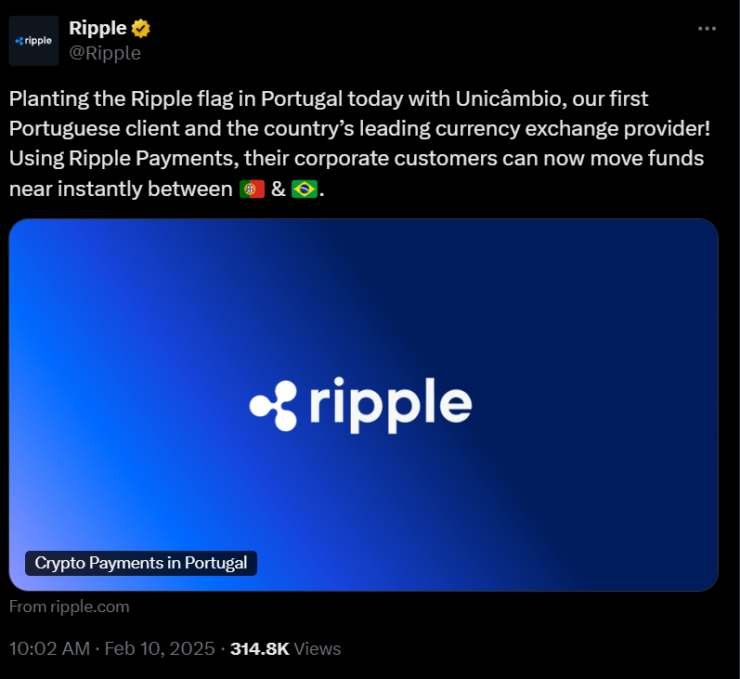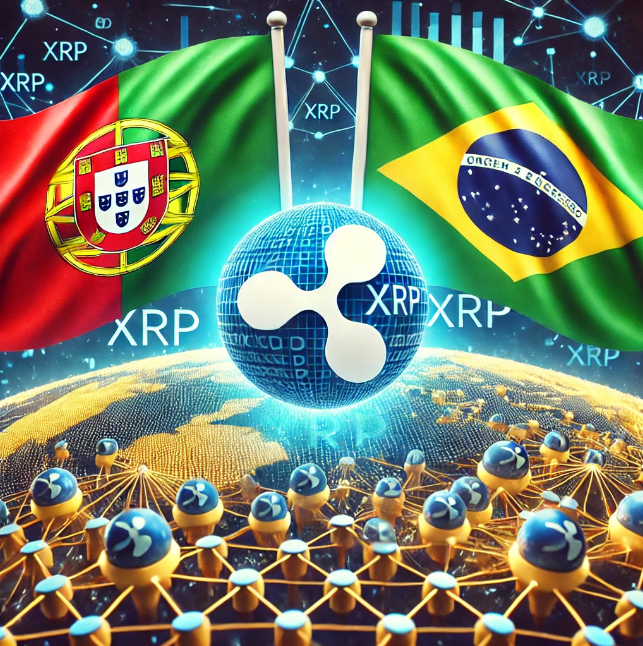Ripple is making significant strides in expanding its global payment network, this time strengthening its presence in Portugal through a partnership with Unicâmbio, one of the country’s leading currency exchange providers.
This strategic move not only enhances Ripple’s foothold in the European financial landscape but also further cements its growing influence in Latin America, particularly Brazil, where it has already established strong collaborations with financial institutions like Travelex Bank and Mercado Bitcoin.
By leveraging XRP for liquidity and settlement, Ripple is introducing faster, more efficient cross-border transactions to the Portugal-Brazil corridor, offering businesses and individuals a seamless alternative to traditional banking systems plagued by long processing times and high fees.

Portugal and Brazil: A Key Cross-Border Payments Corridor
Portugal and Brazil have a deep economic and cultural connection, with significant money flows between the two countries due to trade, business, and remittances. However, traditional banking systems have long made cross-border transactions slow, expensive, and inefficient.
By integrating Ripple’s blockchain-based payments, Unicâmbio’s corporate customers can now enjoy:
- Instant fund transfers, eliminating the long waiting times associated with banks.
- Lower transaction fees, making international remittances and business transactions more cost-effective.
- Secure blockchain settlements, ensuring transparent and seamless money movement.
For businesses and expatriates who frequently send money between the two nations, this collaboration represents a major breakthrough in financial accessibility and efficiency.
Why This Expansion Matters for XRP
Ripple’s payment infrastructure heavily relies on XRP for liquidity, positioning it as a critical bridge currency in facilitating cost-effective, near-instant transactions across different markets.
- XRP ensures seamless conversions, allowing businesses to avoid the high costs and inefficiencies of traditional foreign exchange (forex) markets.
- Each new partnership strengthens XRP’s role in global finance, increasing institutional trust and mainstream adoption.
- With traditional banking models facing pressure to evolve, XRP offers a compelling blockchain-powered alternative to outdated payment systems.
As Ripple continues to scale its operations, each new adoption case reinforces XRP’s utility and its ability to act as a key liquidity provider in the evolving digital financial ecosystem.
Regulatory Progress and Future Growth
Ripple’s expansion into Portugal and Brazil is a reflection of its commitment to regulatory compliance, ensuring that its services meet the standards required by financial regulators in different regions.
- In Brazil, Ripple has worked closely with regulators, securing approvals that allow it to operate legally and securely in the country.
- Portugal’s pro-crypto stance makes it a natural choice for Ripple’s European growth, offering a stable and supportive environment for blockchain-based financial solutions.
- As regulatory frameworks evolve, Ripple is positioning itself as a leader in compliant crypto-enabled cross-border transactions.
By securing key partnerships and maintaining compliance across multiple jurisdictions, Ripple is ensuring that XRP remains a vital part of the financial landscape for years to come.
The Bigger Picture: Ripple’s Role in the Global Crypto Market
As Ripple expands its payment solutions worldwide, it contributes to a larger trend of financial decentralization. The global remittance industry, traditionally controlled by banks and costly payment service providers, is being disrupted by blockchain technology, with XRP leading the charge.
With institutional adoption gaining momentum, Ripple’s latest partnerships signal a future where digital assets and blockchain technology play a key role in mainstream financial systems.
As financial institutions continue seeking faster, cheaper, and more transparent payment solutions, Ripple and XRP are poised to be at the forefront of this evolution.





